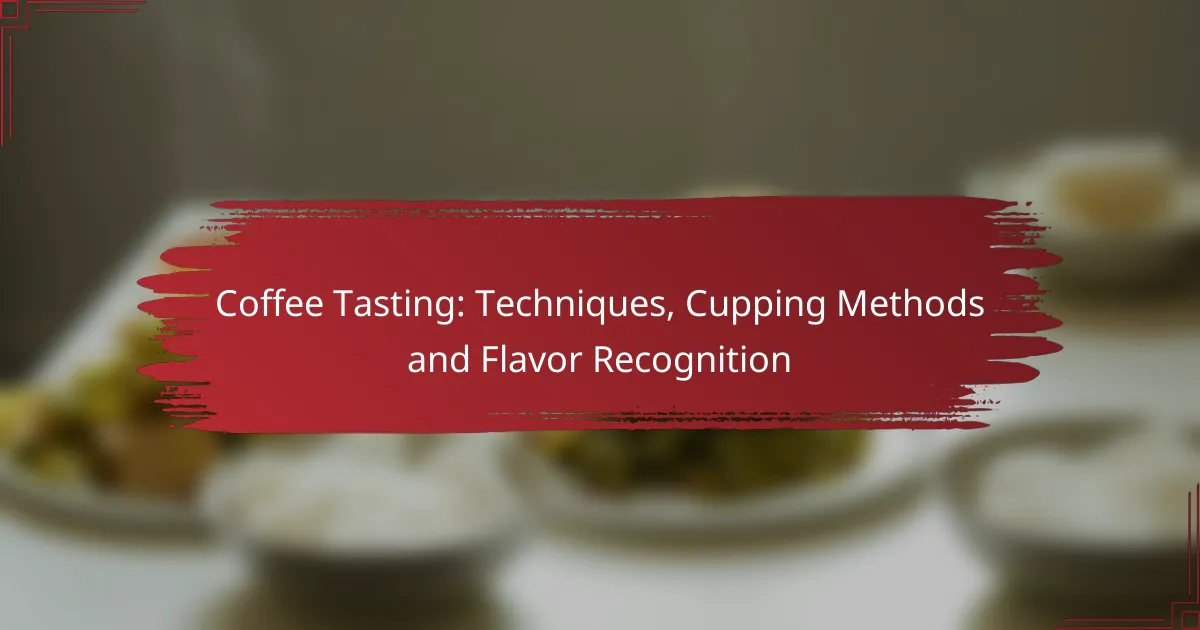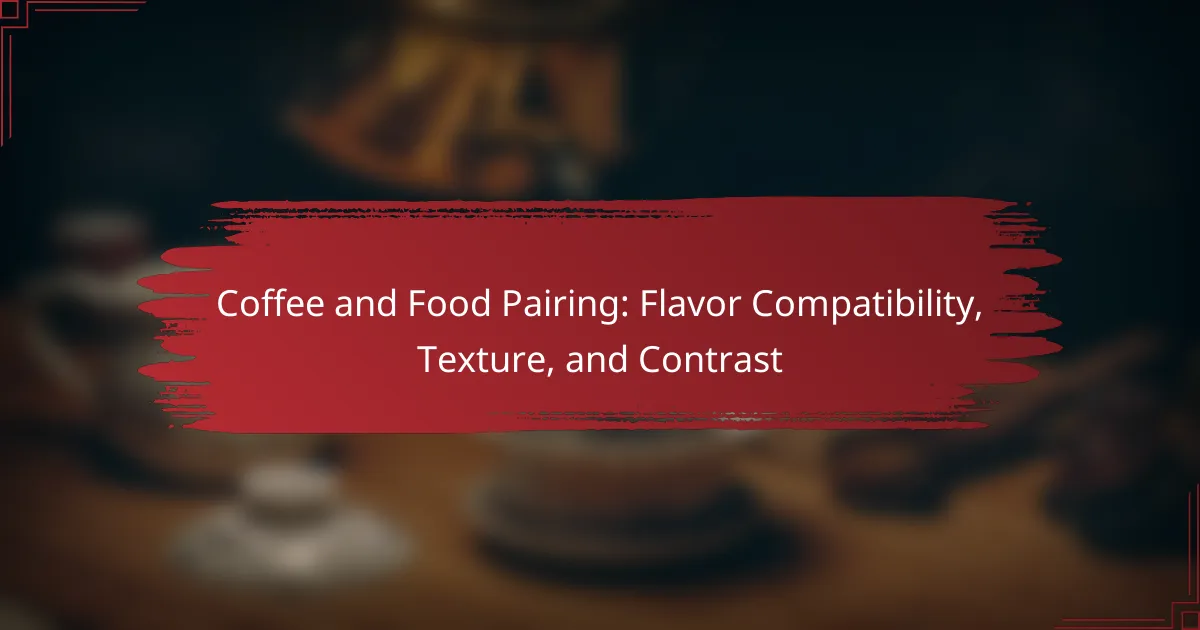The brewing time of coffee plays a crucial role in shaping its flavor, strength, and aroma. Shorter brewing durations can enhance acidity and preserve delicate aromas, while longer times may increase bitterness and strength. Finding the optimal brewing time is essential for achieving a well-balanced cup that highlights the desired characteristics of the coffee.
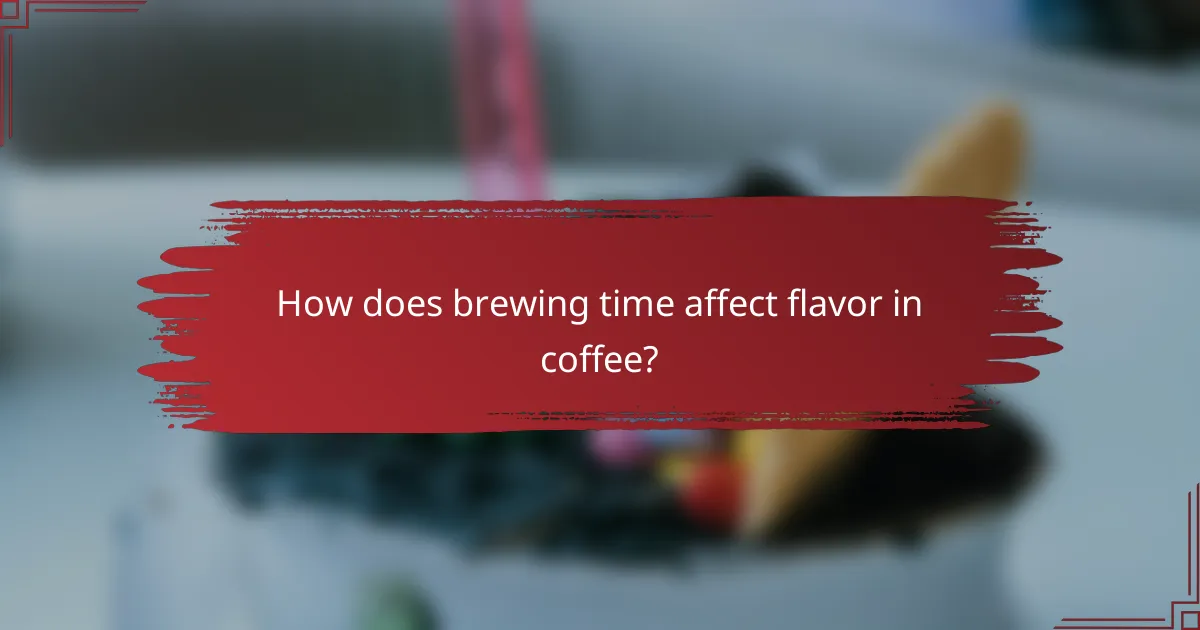
How does brewing time affect flavor in coffee?
Brewing time significantly influences the flavor profile of coffee, affecting its acidity, bitterness, and overall balance. Shorter brewing times typically enhance acidity, while longer times can lead to increased bitterness, making it essential to find the right duration for optimal taste.
Short brewing times enhance acidity
When coffee is brewed for a short duration, it often results in a brighter, more acidic flavor. This is particularly noticeable in methods like espresso or pour-over, where extraction occurs quickly, usually within 20 to 30 seconds or a few minutes.
Short brewing times can highlight fruity or floral notes, making the coffee taste more vibrant. However, if the time is too brief, the coffee may lack depth and complexity, leading to a one-dimensional flavor.
Long brewing times increase bitterness
Conversely, longer brewing times can extract more bitter compounds from the coffee grounds. This is common in methods like French press or cold brew, where steeping can last several minutes to hours. While some bitterness can add depth, excessive extraction may result in an unpleasantly harsh taste.
To avoid over-extraction, aim for brewing times of around 4 to 5 minutes for methods like French press. Monitoring the time helps ensure that bitterness does not overpower the coffee’s inherent flavors.
Optimal brewing time balances flavor
Finding the optimal brewing time is crucial for achieving a balanced flavor profile. Generally, a range of 2 to 4 minutes works well for most brewing methods, allowing for a harmonious blend of acidity and bitterness.
Experimenting with different brewing times can help identify personal preferences. For instance, if a coffee tastes too acidic, slightly increasing the brewing time may help mellow the flavor, while reducing time can enhance brightness in overly bitter brews.
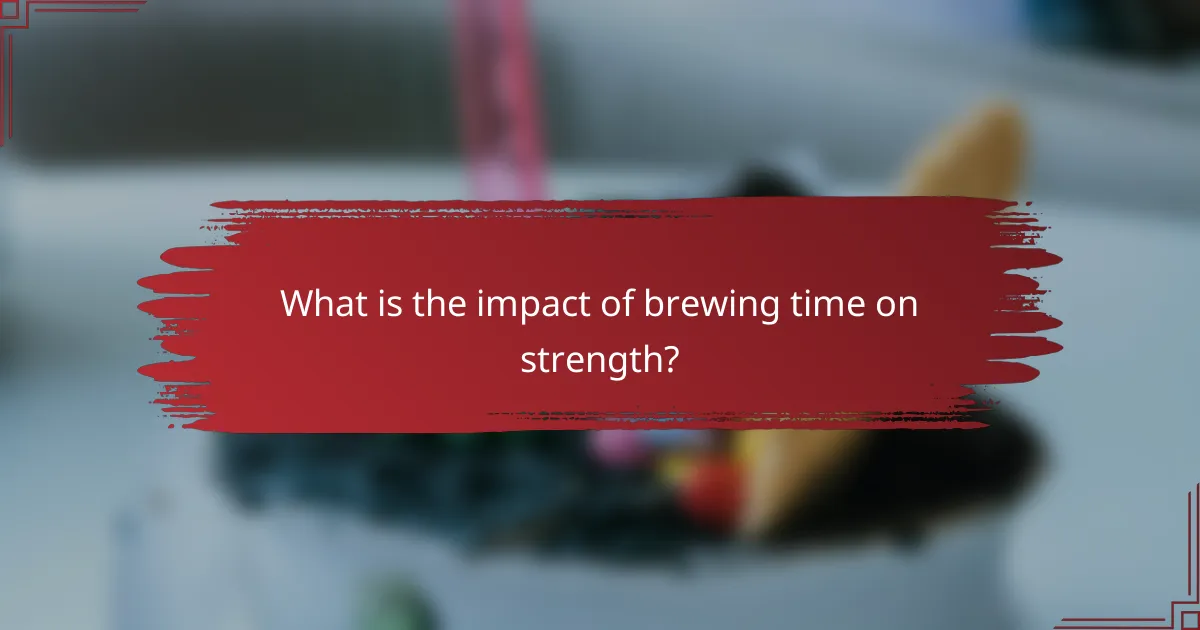
What is the impact of brewing time on strength?
Brewing time significantly affects the strength of coffee, primarily through the extraction of soluble compounds. Longer brewing times generally lead to a stronger cup, but there are limits to consider to avoid over-extraction and bitterness.
Brewing time influences caffeine extraction
The duration of brewing directly correlates with caffeine extraction. As coffee grounds steep in water, caffeine is released into the brew, with most extraction occurring within the first few minutes. For example, a typical brewing time of 4 to 5 minutes can yield a moderate caffeine level, while extending this to 8 to 10 minutes can increase caffeine content significantly.
However, the extraction rate can vary based on the grind size and water temperature, so adjustments may be necessary for different brewing methods. For instance, finer grinds may extract caffeine more quickly, allowing for shorter brewing times.
Longer brewing times yield stronger coffee
Longer brewing times generally produce a stronger flavor profile due to increased extraction of oils and solids from the coffee grounds. This can enhance the body and richness of the coffee, making it more robust. A brewing time of around 5 minutes is common for methods like drip coffee, while French press can benefit from steeping for 4 to 6 minutes.
However, excessively long brewing can lead to over-extraction, resulting in undesirable bitterness. A good rule of thumb is to monitor the brewing time closely and taste periodically to find the optimal strength without crossing into bitterness.
Brewing method affects strength perception
The method used to brew coffee can significantly influence how strength is perceived, even with the same brewing time. For example, espresso, which brews quickly under pressure, can taste stronger than drip coffee despite having less caffeine per ounce due to its concentrated flavor.
Different brewing techniques, such as pour-over or cold brew, also extract flavors differently, affecting the overall strength. Cold brew, for instance, typically requires a longer steeping time but results in a smoother, less acidic cup that some may perceive as stronger due to its rich flavor profile.
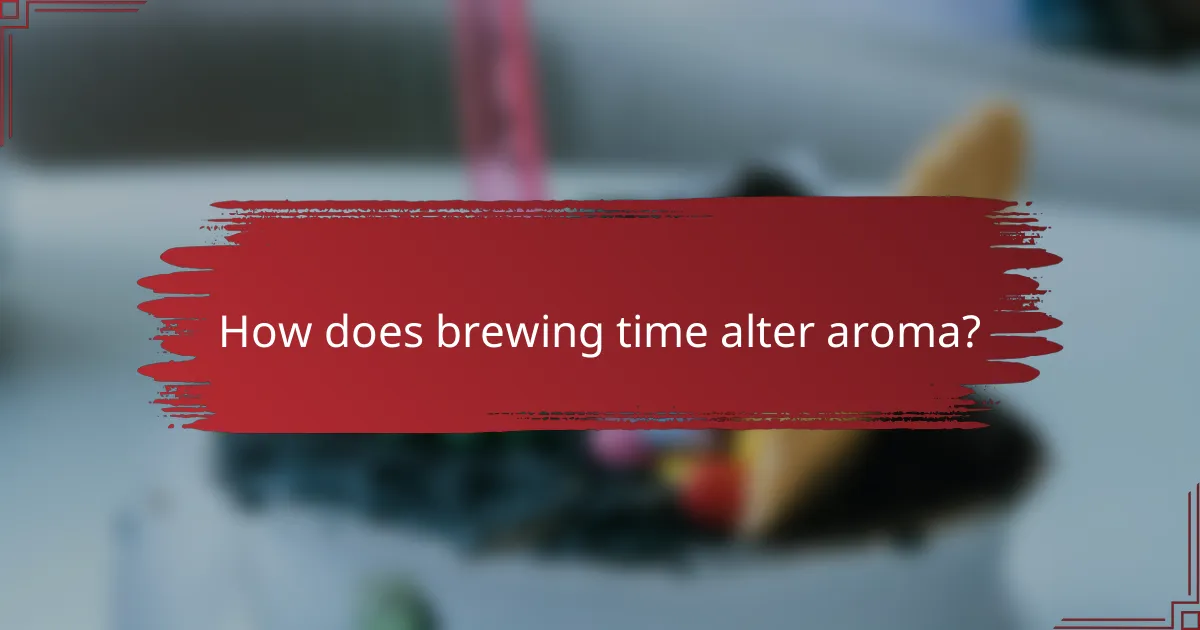
How does brewing time alter aroma?
Brewing time significantly impacts the aroma of beverages by influencing the extraction of volatile compounds. Shorter brewing times tend to retain more delicate aromas, while longer times can lead to a loss of these subtle scents.
Short brewing times preserve delicate aromas
When brewing for shorter durations, such as a few minutes, the extraction process focuses on lighter, more volatile aromatic compounds. This is particularly beneficial for beverages like green tea or light coffee, where the goal is to highlight floral and fruity notes.
To maximize aroma retention, aim for brewing times of 2-4 minutes for teas and 3-5 minutes for lighter coffee brews. This approach helps maintain the freshness and complexity of the aromas.
Long brewing times can mute aromas
Extending brewing times often results in the extraction of heavier compounds, which can overshadow the more delicate aromas. For example, brewing coffee for over 6-8 minutes can lead to a bitter taste and a less fragrant profile.
To avoid muted aromas, monitor brewing times closely and consider using methods like cold brewing, which allows for longer extraction without overwhelming the flavor profile.
Freshness enhances aroma at all brewing times
Regardless of brewing time, the freshness of the ingredients plays a crucial role in aroma. Freshly roasted coffee or recently harvested tea leaves contain more volatile compounds, leading to a more vibrant aroma.
For optimal results, use freshly ground coffee within a week of roasting or tea leaves that have been stored properly. This practice ensures that even with longer brewing times, the aroma remains appealing and complex.
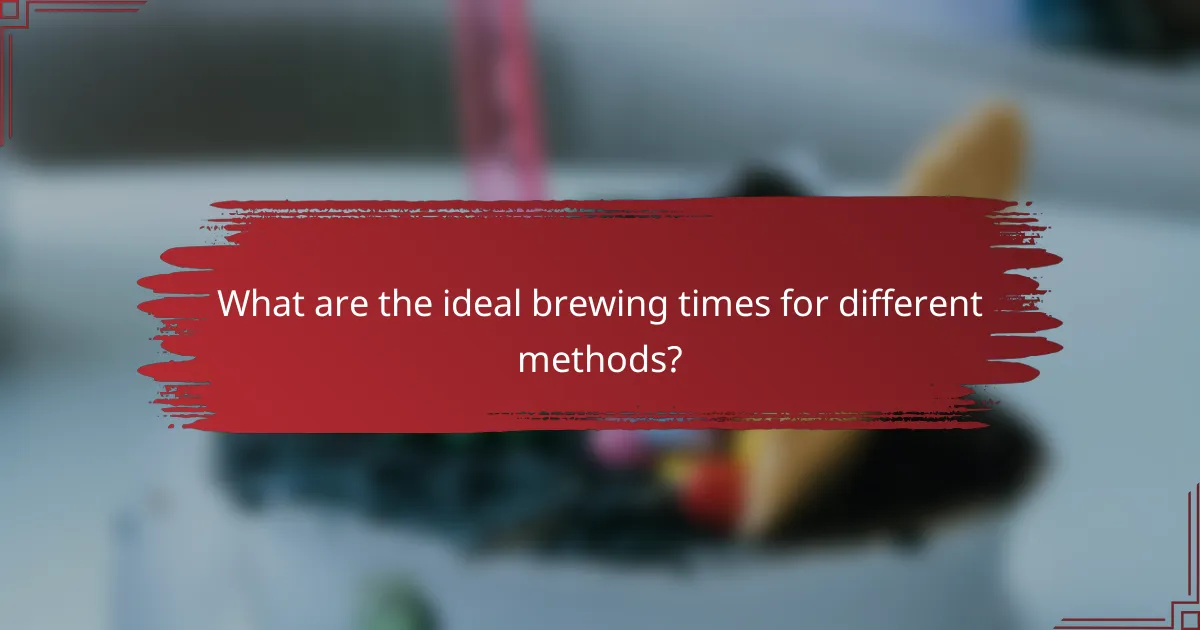
What are the ideal brewing times for different methods?
The ideal brewing times vary by method and significantly influence the flavor, strength, and aroma of the coffee. Understanding these times helps in achieving the desired taste profile for each brewing technique.
Espresso: 25-30 seconds
Espresso brewing requires a short extraction time of 25 to 30 seconds. This rapid process uses high pressure to force hot water through finely-ground coffee, resulting in a concentrated shot with rich flavors and a creamy crema on top.
To achieve the best results, ensure your coffee is freshly ground and tamped evenly. Over-extraction can lead to bitterness, while under-extraction may result in sourness. Adjusting the grind size and tamping pressure can help fine-tune the flavor.
French press: 4 minutes
The French press method typically involves a brewing time of around 4 minutes. This immersion technique allows coarsely ground coffee to steep in hot water, extracting oils and flavors for a full-bodied cup.
For optimal results, start with a coffee-to-water ratio of about 1:15. After 4 minutes, press the plunger down slowly to separate the grounds from the liquid. Avoid steeping for too long, as this can lead to over-extraction and a bitter taste.
Pour-over: 3-4 minutes
Pour-over coffee generally takes between 3 to 4 minutes to brew. This method involves pouring hot water over coffee grounds in a filter, allowing for precise control over the extraction process.
To achieve a balanced flavor, use a medium grind and a coffee-to-water ratio of approximately 1:16. Pour the water in a circular motion to ensure even saturation. Timing is crucial; aim for a total brew time of 3 to 4 minutes to avoid bitterness from over-extraction.
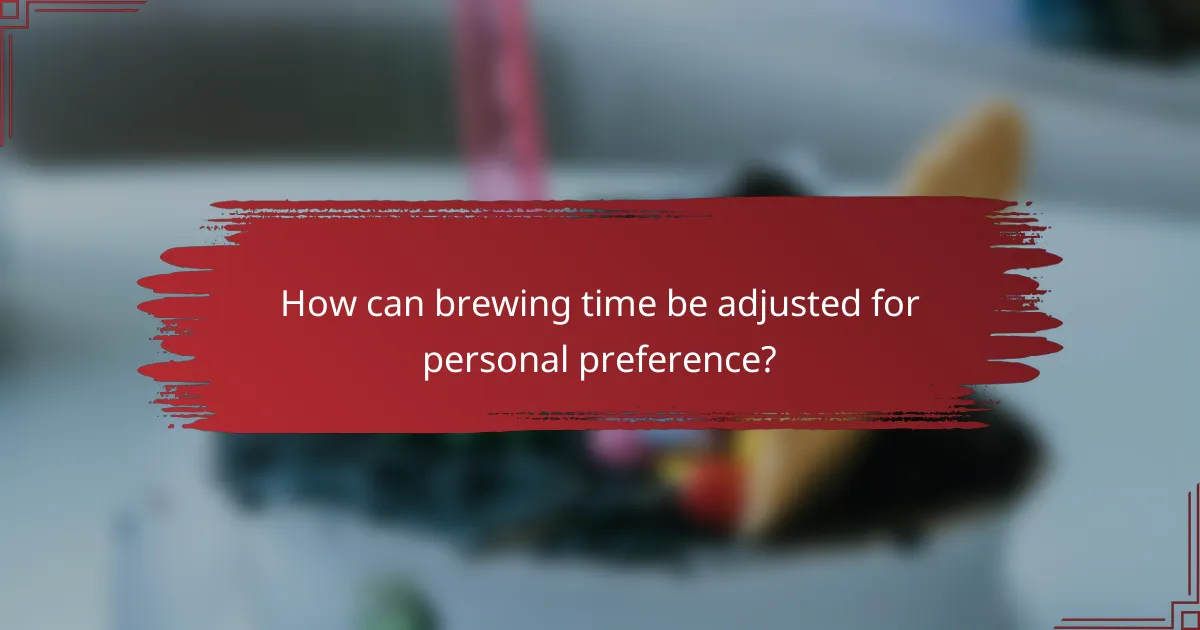
How can brewing time be adjusted for personal preference?
Brewing time can be tailored to enhance flavor, strength, and aroma according to individual taste. By experimenting with various brewing times, you can find the perfect balance that suits your palate.
Experiment with grind size
The grind size of your coffee beans significantly influences brewing time and extraction. Finer grinds increase the surface area, leading to quicker extraction, while coarser grinds slow it down. For instance, if you prefer a stronger flavor, try a finer grind and reduce the brewing time slightly.
As a general guideline, for methods like espresso, a fine grind is ideal with a brewing time of around 25-30 seconds. In contrast, for French press, a coarse grind with a brewing time of about 4 minutes works best. Adjusting grind size can help you achieve your desired strength and flavor profile.
Adjust water temperature
Water temperature plays a crucial role in the brewing process, affecting how quickly flavors are extracted. Generally, water temperatures between 90°C and 96°C (194°F to 205°F) are optimal for most brewing methods. Higher temperatures can extract more flavors but may also lead to bitterness if brewed too long.
For a smoother taste, consider using slightly cooler water, around 90°C (194°F), and extending the brewing time. Conversely, hotter water can be used for shorter brewing times to achieve a bolder flavor. Always monitor your results and adjust accordingly to find what best suits your taste preferences.

